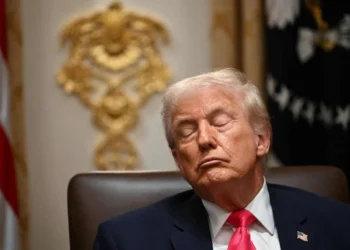Samson Itodo, the Executive Director of YIAGA Africa, a civil society organisation, believes the off-season governorship elections in Kogi and Imo states in November 2023 and the September 2024 governorship poll in Edo State were worse than the 2023 general elections. In his view, rather than improve, Nigeria’s electoral process has regressed in the last two years. Itodo was on Channels Television’s News Night programme.
Excerpts…
Two years into the administration of President Bola Tinubu, what’s your midterm assessment of his government?
I think it’s a mixed bag for a lot of reasons. To assess the president and his administration, we need to first look at his promises and whether he’s fulfilling those promises. Secondly, to what extent is he able to fulfill the constitutional duty of providing for the welfare and the security of the Nigerian people?
Yes, undoubtedly, the president has taken some bold actions, whether it’s the removal of fuel subsidy, the flotation of the naira or looking at how other sectors can contribute to our GDP. So, you give it to him. He’s taking those actions. We’ve also seen him now appoint ministers that are providing some stellar leadership, whether it’s in the aviation sector, or youth development or in the interior ministry.
He’s also led some very remarkable reforms around strengthening local governments with the institution of the suit that led to the Supreme Court granting financial autonomy to local governments. So, we have seen some progress on that front.
READ ALSO:NCDC Issues Alert On Dengue Fever, Cholera, Mpox, Diphtheria Outbreaks
However, you also need to look at where there are certain drawbacks. If you look at the impacts of some of these decisions on Nigerians, you will see that Nigerians are grappling with all forms of economic hardship. Some of these decisions have brought untold hardship.
We’ve also not seen a commensurate understanding and shift in the lifestyle of public officials. On one hand, the state is asking citizens to understand how to cut down their priorities but we don’t see that on the part of the state. The state is still expending a lot of resources on frivolities. If you look at the budget and how much is budgeted for the upkeep of public officials, you will see that there is a mismatch between what public officials do and what they say.
On security, Nigerians are sleeping with one eye closed in several parts of the country. Look at Benue, Borno, Plateau, Zamfara, and Taraba. The country is grappling with those intractable problems of insecurity, and one wonders whether the government is fulfilling its responsibility of providing security for the vast majority of Nigerians.
We have also seen a clampdown on the rights of citizens, whether they are the right to protest or a restriction on the right to free speech.
So, it’s a mixed bag. Yes, some positive steps have been taken, but Nigerians are still clamouring for governance that does not bring untold hardship to the people and that makes them feel safe and secure in their country.
Looking at these issues, what roles do governors play?
If we look at the subnational entities, I dare say that there’s a short supply of quality governance, and that’s disappointing. There are very few governors that you can point to and say they are performing and delivering on the promise of democracy. Instead, what you see is governors who are so empowered but are doing little for their people.
Are governors delivering on some of their promises? Some governors are delivering, but some states have witnessed the absolute collapse of governance. The country cannot record remarkable progress if you don’t have efficient and transparent leadership at the state level.
It’s the same thing when you look at the other institutions of government. When you look at the state legislature across the entire country, can you say that there’s effective legislative governance? Most of the state houses of assembly cannot limit the excesses of the exercise of executive powers in the states.
A lot of them are subject to the whims and caprices of their governors. So, even though the constitution grants them legislative authority or independence, it is far from the expectations and the desired outcomes of those laws.
You have critiqued the relationship between the current National Assembly and the executive. What would you love to see?
I’d love to see a National Assembly that is bold and courageous to provide the necessary oversight to limit and checkmate the excesses of the executive. This present National Assembly, especially the Senate, has done a poor job of holding the executive to account. The House of Representatives, compared to the Senate, has demonstrated courage on several issues, whether it’s around appointments, budgets, or public policies. We see a courageous House of Representatives compared to the Senate.
I think it’s an oversimplification and trivalisation of the concept of checks and balances. It’s disappointing that public leaders at that level trivalise the whole concept of accountability. Democracy is about accountability. There’s a reason the National Assembly exists; it exists to make laws, to perform oversight and to represent the people.
We cannot have a National Assembly that does not keep the executive in check, with the executive acting outside its powers. The National Assembly has to put the executive in check. Holding them to account is in the public’s interest. That’s why we have checks and balances and separation of powers.
Currently, sometimes, we don’t know the fundamental difference between the National Assembly and the executive. And that’s unfortunate for our democratic process. The executive has gotten away with a lot of things because of the character and the nature of the National Assembly. And that needs to stop. This whole thing, where you pass legislation in one day without public scrutiny, it’s unacceptable in a democracy.
Two years after the 2023 election, how would you say we’ve moved forward in addressing some of the challenges that came up in that election?
Every Nigerian knows that we’ve not moved forward with our elections since 2023. We’ve had by-elections, we’ve had off-cycle elections since 2023, and I say it’s been a downward spiral, disappointingly so. In fact, in some of the instances, the 2023 election was even better than some of the off-cycle elections, because what we saw in the subsequent elections was a complete erosion of the whole concept of integrity in all those elections.
The only election post-2023 that we can see meets the integrity test is the Ondo election. The Edo election, the Imo election, and the Kogi election all failed to meet the integrity test. This is based on the assessment of election observers, including Yiaga Africa, because we saw a high degree of election manipulation.
In a place like Kogi, we saw pre-filled result sheets. We didn’t see that in the 2023 elections. We are seeing a reversal of all the gains that we’ve made since 2015 to date. We are seeing politicians resort to old-fashioned ways of manipulating results because prefilled results made it to the polling units in the Kogi election. Yiaga Africa put that out, and INEC confirmed that they were pre-filled results in the election. Interestingly, the election was upheld in court.
In a place like Edo where Yiaga Africa and other election observers released reports that it didn’t meet the integrity test.
So, when you look at the elections down the line, we’ve just seen a regression. So, we’ve not moved forward with our electoral process. And what is heartbreaking is that INEC introduced remarkable reforms. The BVAS, the IREV, and several innovations that this electoral commission introduced. All of them have been brought to their knees because of the desperation of certain political actors who seek power at all costs. That is disappointing.
I know there are talks on electoral reforms. What do you think?
Several things are being looked at. I am part of the technical committee established by the National Assembly on the electoral amendments, and one issue that has not featured prominently is the demand to make electronic transmission mandatory. Citizens have demanded that civil society release a citizens’ memorandum, and one of the top five non-negotiable reforms is mandatory electronic transmission of results.
The whole advocacy is not to replace the manual process with the electronic process, but for both of them to go hand in hand, so they can serve as a check on each other. I’d say that electronic transmission is not a priority issue in some of the conversations that I have heard with the lawmakers, and I think that it’s important for citizens to continue to demand electronic transmission or nothing.













